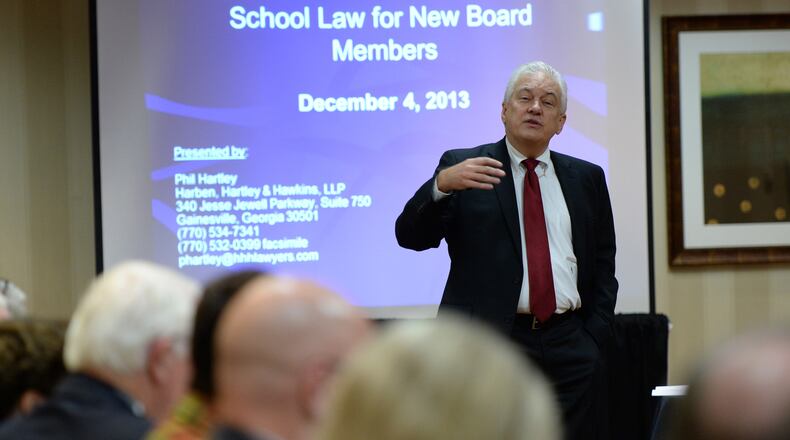Atlanta Board of Education runoff results
District 5
Steven Lee, 1,883 votes, 59 percent
Mary Palmer 1,285 votes, 41 percent
District 6
Eshe Collins, 1,368 votes, 59 percent
Dell Byrd, 948 votes, 41 percent
District 8 At-Large
Cynthia Briscoe Brown 9,885 votes, 66 percent
Reuben McDaniel, 5,125 votes, 34 percent
District 9 At-Large
Jason Esteves, 10,474 votes, 71 percent
Lori James, 4,183 votes, 29 percent
Now that Atlanta voters have replaced six of their nine elected education leaders, a daunting public school turnaround effort will begin.
The new school board is out to prove that this election made a difference, that change is possible in the struggling school district, that students in an urban education system can make big academic improvements.
They’ve seen the city school system damaged by scandal and squabbles, and say they’re looking forward to a new era of collaboration to benefit the 49,000 students they serve.
The rookie board members hit the ground running Wednesday by receiving training on how to be effective in their new jobs — skills they’ll need to take on the enormous task of raising the city’s 51 percent graduation rate and boosting academic results that trail every other school system in the metro area.
“The new board will work together much more than the last board,” said Jason Esteves, an attorney and former middle school social studies teacher who won his runoff for a citywide seat Tuesday. “With six new members, I think there will be a sense of confidence in the community. People will have a clear picture of what our vision is.”
With four representatives who are former teachers under 40 years old, the incoming board gains educational experience and energy while losing some of the knowledge of members who had sat on the school board for years.
When the new board is sworn in Jan. 6, even the most senior board members will have held their positions for only four years.
Making up the young crowd are Esteves, the school board’s first Hispanic member; Eshé Collins, an attorney and program director at Georgia State University; Matt Westmoreland, a history teacher at Carver Early College; and Courtney English, a strategy and development consultant. All four got their start in education through the Teach for America program, which recruits recent college graduates to teach in low-income communities.
“I don’t necessarily think that age is a determining factor of experience. Older folks become entrenched in old ideas. They become part of the bureaucracy,” English said. “This is an opportunity for a fresh start.”
During their training Wednesday, the Georgia School Boards Association taught them about ethics, education laws, running effective meetings and how to set policies without interfering with the administrative job of the superintendent. One of their essential goals, according to state law, is to maintain accreditation for the benefit of the city’s students.
While they’re a diverse bunch, school board members said Wednesday their priority is to work as a team from the start.
“Before we can lead, we as a group need to develop a sense of collaboration,” Collins said.
Once they take office next month, the board members will have to make a series of critical decisions setting the course for the future of education in Atlanta.
They’ll pick a superintendent to replace Erroll Davis, who is retiring early next year. They’ll try to find ways to give school principals more authority, freeing them from mandates handed down from administrators in Atlanta Public Schools’ downtown headquarters. They’ll work to avoid high school dropouts, get parents involved and offer a more challenging curriculum.
“One of the reasons many of us ran for school board was to put behind us the divisiveness and infighting of the past,” said Cynthia Briscoe Brown, an attorney who defeated board Chairman Reuben McDaniel on Tuesday. “Everyone in this group is committed not to always agreeing with one another, but to listening and learning from each other and working together without political agendas.”
The school system is still recovering from a series of controversies: the nation’s largest cheating scandal, an accreditation crisis and a painful redistricting process that resulted in several school closings.
“The new board is fully aware that those wounds exist and is aware of the strained relationships that led to them,” Westmoreland said. “You’re going to see a concerted effort on our part to work as cooperatively with one another as possible to make sure issues like that don’t ever come up again.”
Although four board members graduated from the Teach for America program, that doesn’t mean they have an agenda to promote charter schools, Esteves said. About 1 in 12 Atlanta students are enrolled in independently managed charter schools, raising concerns from some parents that their growth comes at the expense of traditional schools.
“People shouldn’t be concerned that there will be some radical change or that there’s a conspiracy theory of privatization,” he said. “You’ll find the opposite: We’re invested in making sure our traditional schools are among the best in the state and country.”
About the Author
Keep Reading
The Latest
Featured



